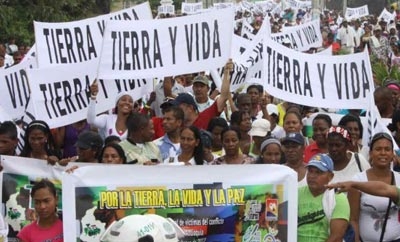A human rights watchdog in Colombia documented a rise in killings of human rights defenders in 2013 with paramilitaries the primary perpetrators, a development likely linked to continued push-back against land reform by economic interests with criminal ties.
The annual report (pdf) of the Colombian NGO Somos Defensores noted an increase in the number of human rights workers murdered, from 69 in 2012 to 78 in 2013. Of the 78 defenders killed, 15 were reportedly by paramilitary groups, eight by guerrillas, 5 by members of government security forces, and 50 by unknown authors.
These numbers represent an increase in assassinations by paramilitary groups (from nine in 2012 to 15 in 2013) and security forces (from one to five), and a decrease in those by guerrillas (from 11 to eight). Somos Defensores speculates this decrease may be tied to advances in peace talks between the government and the Revolutionary Armed Forces of Colombia (FARC) in Cuba.
Overall, Somos Defensores counted 366 aggressions against human rights defenders and social organizations, including threats, assaults, forced disappearances, and arbitrary detentions. The NGO attributed 50 percent of these incidents to paramilitaries.
The most targeted human rights leaders were farmers, indigenous people, and those fighting for land restitution, while murders of rural leaders increased from three in 2012 to 15 in 2013.
InSight Crime Analysis
The targeting of human rights defenders in Colombia is generally a result of these defenders crossing the paths of powerful economic elites with criminal ties looking to protect their interests, and the problem has been particularly acute in regards to the intimidation of land activists, often by paramilitary-style groups.
The issue has its roots in Colombia’s armed conflict, when many rural and indigenous communities were displaced from resource rich land by paramilitaries, often working on behalf of private agri-businesses and cattle ranchers. Since the formal demobilization of the United Self-Defense Forces of Colombia (AUC), some of these businesses have continued to use neo-paramilitary criminal groups such as the Urabeños to suppress calls for land reform through targeted assassinations of activists.
Drug trafficking also complicates land restitution, with groups such as the Urabeños and the Rastrojos controlling drug corridors in areas central to the land conflict.
SEE ALSO: Coverage of BACRIM
According to Human Rights Watch (HRW), the paramilitary drug trafficking hybrid organizations labeled the “BACRIM” groups (for the abbreviation of the Spanish for “criminal bands”) now represent the most serious impediment to Colombia’s land restitution process. They have also been pointed to as responsible for 30 percent of human rights violations in the country.

